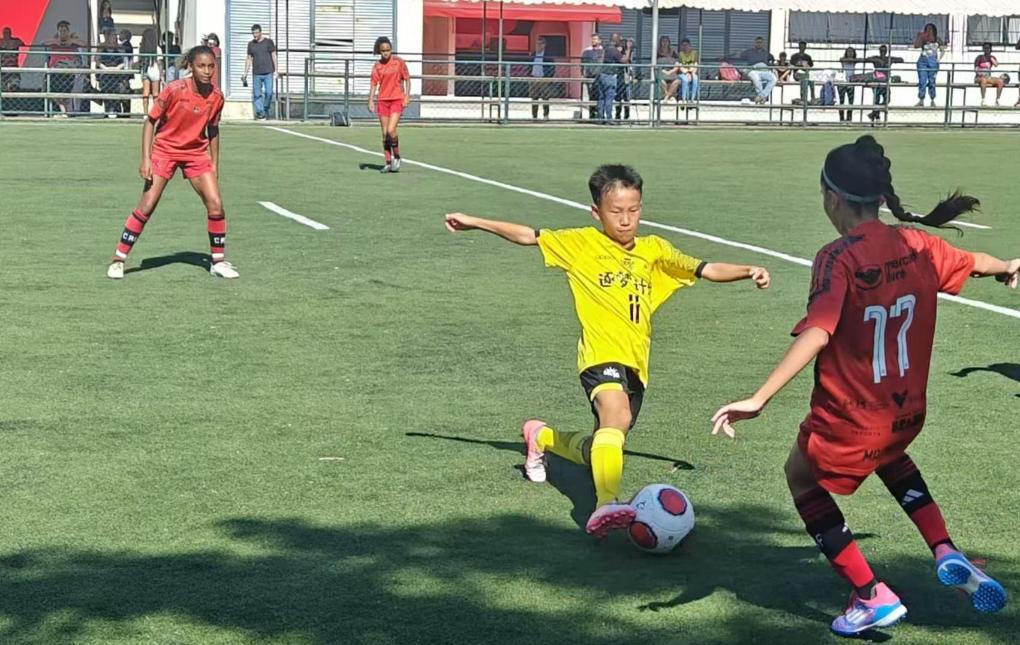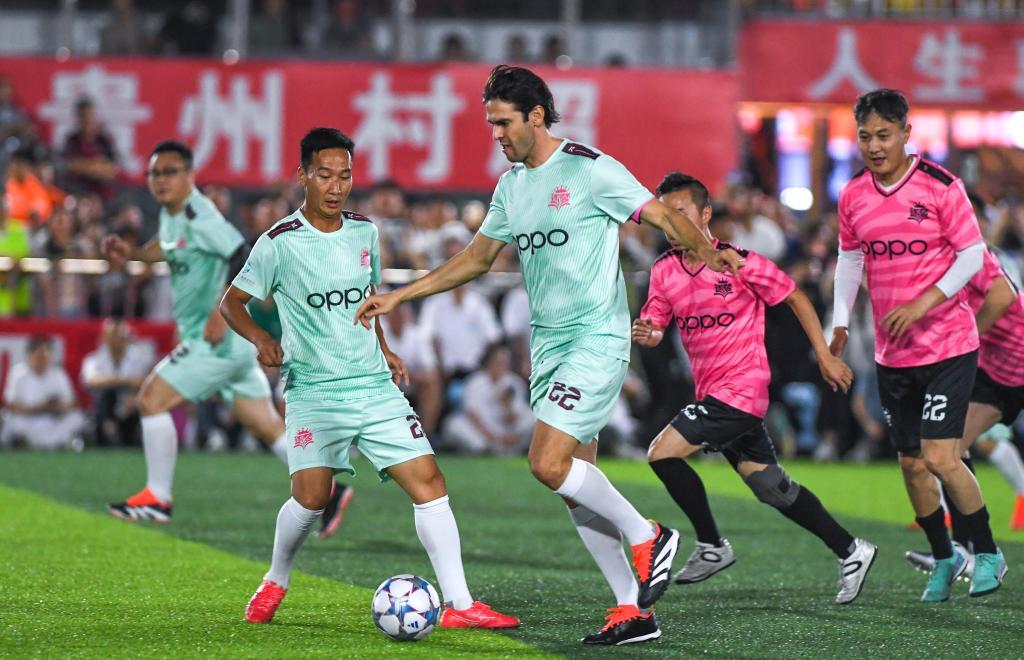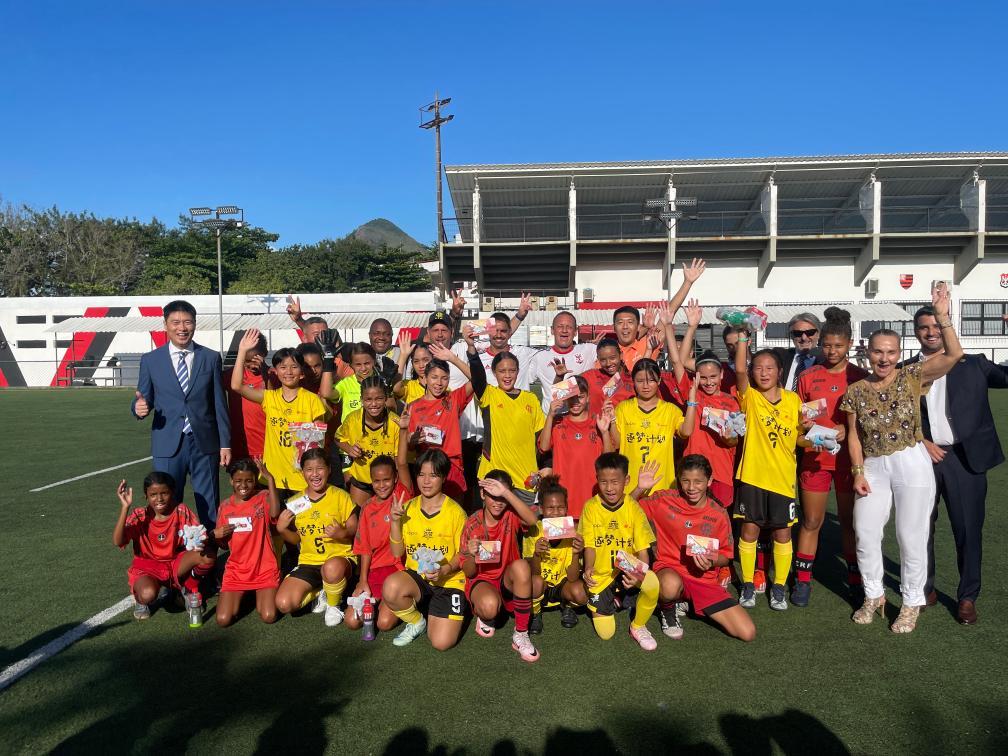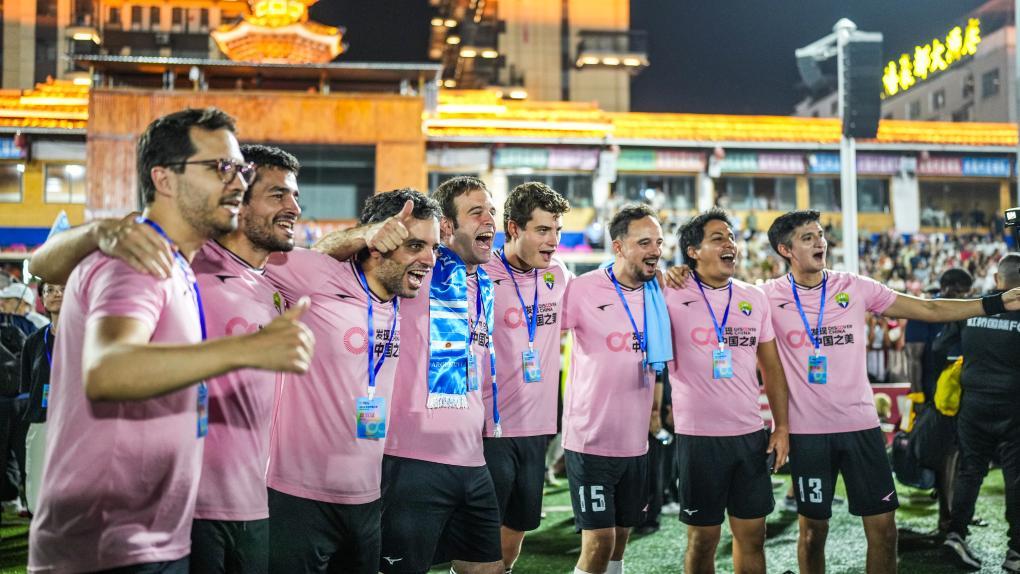Xinhua News Agency, Beijing, November 21st: This “two-way rush” continues to write a new chapter in China-Pakistan friendship
Xinhua News Agency reporters Gong Bing, Zhao Yan, Luo Yu
Maracana Stadium, Brazilian Football Museum, Flamengo Football Club… Pan Cuicui, a girl from Rongjiang, Guizhou, has been overwhelmed these days. The “holy land” of Brazilian football that only existed in her mind before is now right in front of her. Coming from Rongjiang, a small town in Guizhou, to the international city of Rio de Janeiro, she felt both excited and nervous. In Rio, she can meet groups of young people and children playing football almost everywhere, whether on the streets, in open spaces, on the beach, or in the woods. The charm of Brazil’s “football kingdom” is fully demonstrated.
The Guizhou Rongjiang “Dream Project” youth football team took a group photo at the Maracanã Stadium. Photo provided by interviewee
As a representative of the globally popular Guizhou “Village Super League”, Pan Cuicui and five other friends formed the Guizhou Rongjiang “Dream Chase Project” youth football team. With their infinite love for football and persistent pursuit of their dreams, they crossed thousands of mountains and rivers and finally arrived in Brazil, the “Temple of Football”, embarking on a journey of extraordinary football friendship exchanges.
This is not only a football exchange, but also a vivid portrayal and a new chapter of the profound friendship between the two peoples.
Crossing mountains and seas to pursue dreams passionately
On the 16th local time, the children were not only invited to watch the first round of the Brazilian Women’s Football League final, but also appeared on the field as ball boys for the Flamengo team.
“I was very excited at the time. I saw the Brazilian female football players who were tall, had bright smiles, and their eyes were full of confidence and pride,” Pan Cuicui said.

Xu Xiangyang (second from right) during the communication competition. Photo provided by interviewee
Xu Xiangyang has loved playing football since he was a child. Although he is just 10 years old, he has already been to Shenzhen, Wuzhou, and played in France, and even played with Brazilian football legend Kaká.
Xu Xiangyang said: “The children in Brazil are very warm and friendly. We all have a common hobby of football and get along very well. Although we don’t understand the language, we all have a great time communicating.”
“We especially want to invite Brazilian young players to play with us in the Guizhou Village Super League.” Pan Cuicui expressed her true feelings.
Yang Jiarui, who has won several domestic youth league championships, has seen “big scenes”, but she was still shocked when she walked into the Maracanã Stadium.
As the venue for the 2014 World Cup final, the Maracana Stadium, which can accommodate about 80,000 spectators, is very spectacular. It has witnessed the glory of Brazilian football and the fanaticism of the fans.

The Guizhou Rongjiang “Dream Plan” youth football team is undergoing exchange training in Brazil. Photo provided by interviewee
After the friendly match on the 18th, Yang Jiarui felt deeply: “Football is very popular here. You can see football fields and clubs everywhere. There will also be some logos about football painted on the walls. I must learn foreign languages well in the future so that I can Communicate with international friends.”
The enthusiasm of the Chinese young players received a positive response from the Brazilian young players.
Laura said: “I have never had such an experience. I find it very interesting. I am very grateful for such an event. I hope there will be more exchange opportunities like this in the future.” Sabella feels that the Chinese young players are like family, “I hope they You can come and play with us more often.”
As a teacher accompanying the team, Yang Xianze hopes to sow the seeds of football dreams in the hearts of children through this event, and with dreams, there will be goals to strive for. She also hopes that the trip to Brazil can inspire more “village super” teenagers who love football, “as long as you have a dream, nothing is impossible.”
“Going in both directions” to achieve mutual success
This trip to Brazil is not the first time Rongjiang Football has visited. In December 2023, the “Dream Chasing” Rongjiang Youth Women’s Football Team went to Spain to visit Real Madrid Football Club, launching the first external exchange event in the history of Rongjiang football. In July this year, the Guizhou “Village Super League” team went to France to meet friends with football…
“Village Supermarket” is going global and welcoming guests and friends from all over the world.

On May 27, Kaká (middle) shook hands with the participating players. On the same day, the “Dream Chasing” championship charity match was held at the “Village Super” stadium in Rongjiang County, Qiandongnan Miao and Dong Autonomous Prefecture, Guizhou Province. Photo by Xinhua News Agency reporter Liu Xu
On May 27, Brazilian football legend Kaka came to the “Village Super League”, bringing a huge surprise to the people of Rongjiang and injecting more motivation into all the local children who love football.
When Kaka saw more than 20,000 spectators pouring into the stadium, especially the large number of teenagers who interacted with him at the scene, he was deeply moved. “I hope that through my own strength, I can inspire children to have football dreams, chase their football dreams, and realize their football dreams.”
As a member of the 2002 World Cup champion Brazilian team, Kaka’s arrival has undoubtedly improved the “rank” of the “Village Super League”, and the “Village Super League” has also opened a window for foreign friends represented by Kaka to understand China.

On May 27, Kaka (middle) participated in the “Dream Chasing” Champion Star Charity Competition. Photo by Xinhua News Agency reporter Yang Wenbin
On October 3, the first “Village Super League” and “Belt and Road” International Friendly Match welcomed the first Brazilian team – Sao Paulo Gaoqiao Youth Training Football Club. Over the next 20 days or so, Brazilian players experienced China’s development vitality, people’s warmth and friendship, and the profoundness of its culture up close.
On the playing field, they fought hard together with the Rongjiang people; off the playing field, they joined hands with the Dong people to dance the Duoye dance. During the award ceremony, the Brazilian players smiled from ear to ear as they took a group photo holding the “village flavor” prize – local specialty chicken. After the awards were given, the audience walked into the center of the stadium and formed a circle around the Brazilian players. Everyone danced with their arms around their shoulders. The Brazilian players showed off the samba steps, and people enjoyed the friendship and happiness brought by football. The community with a shared future for mankind is concretely presented at these moments.
The history of football exchanges between China and Brazil can be traced back to more than 30 years ago when the Chinese Jianlibao youth team went to Brazil to study. At that time, Chinese young players went to foreign countries to study football skills hard, which infected the local people. Many Brazilian families even offered to take care of the players. The process of football exchanges is infiltrated with the cultural identity of China and Pakistan and the emotional resonance of the two peoples.

A group photo of the Guizhou Rongjiang “Dream Project” youth football team after an exchange match in Brazil. Photo provided by interviewee
In addition to the Jianlibao Youth Team, the Yunnan Hongta Youth Football Team has trained and played at the Sao Paulo Club for nearly three years. Shandong Luneng (now Shandong Taishan) established the first overseas youth training base for Chinese football in Sao Paulo…
Sun Xianlu, the coach who took the Yunnan Hongta youth team to Brazil for training, believes that only by constantly competing with high-level teams can we truly improve our technical and tactical levels; we must learn from the creativity of Brazilian football, because creativity is one of the essences of football games, and China What teenagers lack most is creativity on the court.
China-Brazil sports exchanges go beyond football.
In June this year, the Brazilian National Youth Table Tennis Team visited Guangxi University for an exchange visit and stayed in China for a month of training. This is a reflection of the results of sports exchanges and cooperation among BRICS countries.

On June 15, members of the Brazilian national youth table tennis team held a friendly match with members of the school’s table tennis team and members of the Guangxi table tennis team at Guangxi University (photo by Dong Qinwen). The picture comes from the official social account of Guangxi University Sports College
In September this year, the Chinese Wushu Team visited Brasilia, the capital of Brazil, to participate in the 4th China-Latin America Martial Arts Exchange Forum and China-Latin America Martial Arts Sanda Competition.
Zhou Jianping, vice chairman of the Chinese Wushu Association, said: “Taking the 50th anniversary of the establishment of diplomatic relations between China and Brazil as a new starting point, the two sides will continue to deepen exchanges and cooperation in various fields of martial arts, give the China-Brazil Wushu Association a new era connotation, and work together to promote the construction of a community with a shared future for China and Pakistan. Make contributions to Chinese and Pakistani martial arts people.”
Marcus, chairman of the Brazilian Wushu Federation, said that on the occasion of the 50th anniversary of the establishment of diplomatic relations between Brazil and China, the visit of the Chinese Wushu Team has further deepened the exchanges and cooperation between the Brazil-China Wushu Federation and is of great significance to the development of martial arts in Brazil.
Enhance mutual trust and deepen friendship
The relationship between countries lies in the people-to-people friendship, and the deep friendship between the people is the source of strength for the development of state-to-state relations. People-to-people affinity lies in the heart-to-heart connection, which can lay a solid foundation of public opinion for state-to-state relations.

On September 28, diplomats stationed in China took a group photo on the “Village Super League” football field. On the same day, the “Discover the Beauty of China and Meet the Guizhou Village Super League” international friendly match was held at the “Village Super League” football field in Rongjiang County, Qiandongnan Miao and Dong Autonomous Prefecture, Guizhou Province. 24 diplomats stationed in China played an international friendly match with the local “Village Super League” team. Photo by Xinhua News Agency reporter Tao Liang
Xu Bo, secretary of the Rongjiang County Party Committee, said that for the Rongjiang football team to go global, on the one hand, it will continue to promote the comprehensive deepening of reforms in Rongjiang through continued expansion of opening up to the outside world, thereby promoting the high-quality social and economic development of Rongjiang; on the other hand, it will Cultural football platform to promote people-to-people exchanges. “Village Supermarket” is like a door that allows people around the world to better see the Rongjiang River and feel the vitality of China’s countryside, deepen mutual understanding, promote exchanges and exchanges between each other, and help build a community with a shared future for mankind.
Zhou Qingjie, director of the Sports Foreign Exchange Research Center of the China Foreign Affairs University, believes that sports, as an important part of pragmatic cooperation between China and Brazil and even Latin American countries, play a unique role in enhancing political mutual trust between countries and deepening traditional friendship. “One of the biggest characteristics of sports events is that they are down-to-earth, can touch people’s hearts, and are easy to get closer and resonate with each other.”
Jia Leishi, executive member of the Guangxi Football Association, said that Guizhou’s “Village Super League” is the representative of China’s grassroots football that has gone abroad, while Brazil is recognized as the “Temple of Football” in the world. Because of the common love for football, the young players from the two countries interacted passionately and sparked sparks, which not only deepened the friendship, but also demonstrated the prosperity of Rongjiang as a rural representative of Chinese-style modern development, and demonstrated China’s openness, confidence, and calmness. National image.
Editor: Wu Jiahong

What are the potential risks of cultural appropriation or exploitation when fostering sports exchanges between countries with asymmetrical power dynamics?
Here are some open-ended questions focusing on the key themes of the article, designed to encourage discussion and explore different viewpoints:
**Theme: Football Exchanges Between China and Brazil**
* Beyond the technical skills learned, what cultural exchanges and mutual understanding can occur through football collaborations?
* What are the potential long-term benefits for young footballers participating in these exchange programs? How might these experiences shape their perspectives on the world and their careers?
* The article mentions young Chinese players lacking creativity on the field. How can international exchange programs help foster creativity and innovation in sports?
* What challenges might arise in fostering sustainable and equitable football exchange programs between countries with different economic and social contexts?
**Theme: Broader Sports Exchanges**
* The article highlights table tennis and martial arts exchanges. What other sports could glue Brazil and China closer together through mutual understanding and friendly competition?
* How can sports diplomacy contribute to building stronger diplomatic ties between countries, particularly in times of political tension or disagreements?
* What are the economic benefits of sports tourism and hosting international sporting events, and how can these benefits be shared equitably within both countries?
**Theme: People-to-People Diplomacy**
* The article emphasizes the role of ”people-to-people” connections in strengthening international relations. How can we encourage more meaningful and sustainable connections between ordinary citizens of different countries?
* What are some examples of successful people-to-people diplomacy initiatives beyond sports, and how can these be replicated or adapted to other contexts?
* How can cultural exchanges through sports bridge divides, promote tolerance, and challenge stereotypes?
**Theme: “Village Super League” as a Cultural Platform**
* How can initiatives like the “Village Super League” promote rural development, tourism, and showcase the unique cultural diversity of China to the world?
* What lessons can be learned from the success of the “Village Super League” that can be applied to other rural development projects in both China and Brazil?
* How can transnational sporting events and cultural exchanges contribute to promoting sustainable development goals, such as poverty reduction, community empowerment, and environmental protection?
These questions aim to stimulate thoughtful discussion and encourage readers to consider the wider implications of sports diplomacy and international exchange programs.

